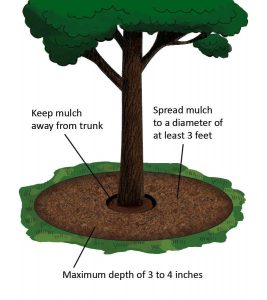How to Care for Your Tree During the Winter
Help Your Tree Survive in Cold Conditions
Winter is here and for most of us that means taking out a blanket and cuddling inside next to the heater for a few months. Our trees, however, don’t get that option and must endure what the Texas weather has in store. Here are a few measures you can take to ensure your tree endures the upcoming Winter months with as little stress and damage as possible:Prune
Throughout the Winter, most trees go into a state of dormancy where they drop their leaves, put photosynthesis on hold, and hibernate while living off food stored away in the roots. This time of dormancy is a great time to prune your tree. Have you noticed any dead, dying, or damaged limbs now that the leaves have fallen? Prune then out before a high wind knocks them out of the canopy and damages anything below. Even if you have a young, newly planted tree, now is a perfect time to do a little structural pruning to give it a good start at life.Mulch
Another proactive step you can take to get your tree ready for Winter is by spreading mulch around your tree or refreshing an existing mulch bed. During the colder months, a nice 1–2-inch layer of mulch around the tree helps insulate the roots and soil against dramatic swings in temperature that can cause serious damage and death in a trees root system.
Mulch also helps to retain moisture in the soil around the tree. This is particularly helpful if we have a dryer winter and the tree gets very little ambient moisture. Remember to spread your mulch around the base of the tree. Do not pile it up around the trunk of the tree. Too much mulch piled up around the trunk of the tree holds too much moisture in and creates a perfect environment for insects, fungi, and other pest to feed on your tree.Water
Just because its cold outside and your tree is going dormant doesn’t mean your tree has stopped needing water. By turning your sprinkler system off completely over the colder months, you cut your tree off from its normal source of water. Younger and newly planted trees need to retain a regular source of water until they can grow a root system large enough to sustain themselves. If you look at the weather and don’t see any rain in the 2-week forecast, plan to water your tree with 10-15 gallons of water within that two-week period.Freeze Prevention
While you’re checking the weather channel for possible rain, be sure to note any days that may approach freezing temperatures. Mature, indigenous trees will need little attention, but if you have any tree species that originate from warmer, more tropical climates, you should have a plan ready to either bring them inside or provide some form of protection from the cold.
An easy way to protect a young or tropical tree from the cold is simply by covering it with trash bags, tarps, or towels to provide a layer of insulation from the freezing temperature. Along with covering your tree, make sure the soil around the tree is thoroughly saturated with water. Water retains a greater amount of heat than air, so having moist soil helps keep the soil around the tree warmer.
